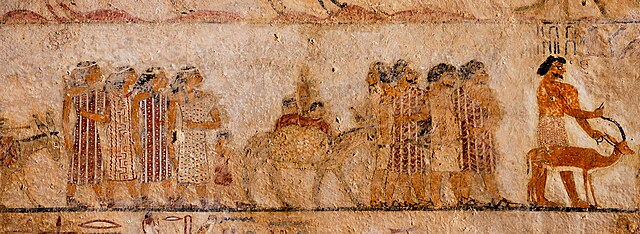
Statue head of an Asiatic man from Avaris, 12th-13th dynasty
https://commons.wikimedia.org/wiki/File … uched).jpg
The only written record of the Hyksos is from Josephus recording what Manetho wrote over a thousand years after the Hyksos dynasty. Manetho portrayed the Hyksos as invaders that conquered through hostile military campaign.
One of the earliest sources describing the dynasty dates to the third century B.C., when a priest named Manetho penned a comprehensive history of history of Egypt. Manetho’s work was later transcribed in fragments by another historian, Josephus. Written long after the Hyksos’ actual reign, the tome claims that the invaders brought an army “sweeping in from the northeast and conquering the northeastern Nile Delta,” according to the paper.
https://www.smithsonianmag.com/smart-ne … 180975354/
Tutimaeus [0]. In his reign, for what cause I know not, a blast of God smote us; and unexpectedly, from the regions of the East, invaders of obscure race marched in confidence of victory against our land. By main force they easily overpowered the rulers of the land, they then burned our cities ruthlessly, razed to the ground the temples of the gods, and treated all the natives with a cruel hostility, massacring some and leading into slavery the wives and children of others. Finally, they appointed as king one of their number whose name was Salitis. He had his seat at Memphis, levying tribute from Upper and Lower Egypt, and leaving garrisons behind in the most advantageous positions. Above all, he fortified the district to the east, foreseeing that the Assyrians, as they grew stronger, would one day covet and attack his kingdom.
http://www.touregypt.net/manethohyksos.htm
Even though there is no corroborating evidence to support this account and it’s based on what someone said of what someone said about something over a thousand years before he was born, historians have taken this account as reliable.
For decades, the writings of the Ptolemaic Egyptian historian, Manetho, influenced the popular and scholarly interpretations of the Hyksos. Preserved in Josephus’s Contra Apionem I, Manetho presented the Hyksos as a barbaric horde, “invaders of an obscure race” who conquered Egypt by force, causing destruction and murdering or enslaving Egyptians. This account continued in Egyptian texts from the Second Intermediate Period and New Kingdom. As Egyptology developed, years of debate over the extent of destruction and the ethnicity of the “Hyksos people” transpired.
https://www.arce.org/resource/hyksos
“Until the excavation and discovery of Tell El-Dab’a (the site of the Hyksos capital Avaris) in 1966, historians relied on these accounts for the Hyksos period.”
https://en.wikipedia.org/wiki/Hyksos
Excavations at Tell el Dab’a have shown it was propaganda.
Along with nearby archaeological investigations, it became apparent that no sound evidence supported the invasion tale. Instead, the excavations at Tell el Dab’a demonstrated that immigrants from Southwest Asia (the Levant) had been relocating to the Eastern Nile Delta for centuries, with this immigration peaking in the mid-12th dynasty through the early Second Intermediate Period. Examination of religious architecture, deities, burial practices, food and artifacts such as weapons and toggle pins all indicated a large population of West Asian individuals. In fact, many of these elements combined Egyptian practices with that of the immigrants, suggesting Tell el Dab’a was a culturally blended community featuring intermarriage and peaceful coexistence.
https://www.arce.org/resource/hyksos
The Egyptians had a systematic campaign to expunge and recast the Hyksos as a barbaric invader. Archaeological evidence shows it was historical revisionism.
Tell El-Dab’a was not initially populated by a military invasion, but started with small numbers occupying the area.
“The Hyksos dynasty, then, was likely the result of an immigrant uprising, not a hostile outside invasion.
It is fascinating to see corroborating evidence from a new direction which demonstrates that men from the Levant did not settle at Tell el-Dab’a in large numbers at the start of the Hyksos period—which is what one might expect to see in the wake of a huge military invasion,” Deborah Sweeney, an Egyptologist at Tel Aviv University who was not involved in the study, tells Haaretz.”
https://www.smithsonianmag.com/smart-ne … 180975354/

The land that the Hyksos settled in, Goshen, was prime real estate in Egypt.
“Goshen is described as the best land in Egypt, suitable for both crops and livestock.”
https://en.wikipedia.org/wiki/Land_of_Goshen
How could a foreign people settle into valuable territory and live in peaceful coexistence with the Egyptians? Why did the Egyptians seem to willingly allow this?
Highly doubtful Egyptians would just freely allow foreigners to come in and take over highly valuable land without a fight. However, if the Joseph account is true, then it would make sense. because it was allowed from the Pharaoh himself.
Gen 47:5-6 (KJV)
5 And Pharaoh spoke unto Joseph, saying, Thy father and thy brethren are come unto thee:
6 The land of Egypt [is] before thee; in the best of the land make thy father and brethren to dwell; in the land of Goshen let them dwell: and if thou knowest [any] men of activity among them, then make them rulers over my cattle.
https://debatingchristianity.com/forum/viewtopic.php?p=1069154#p1069154
